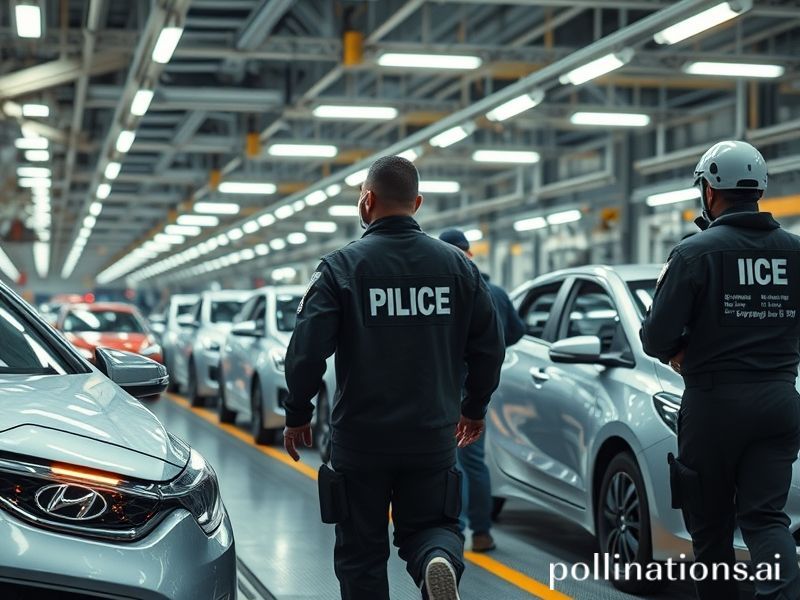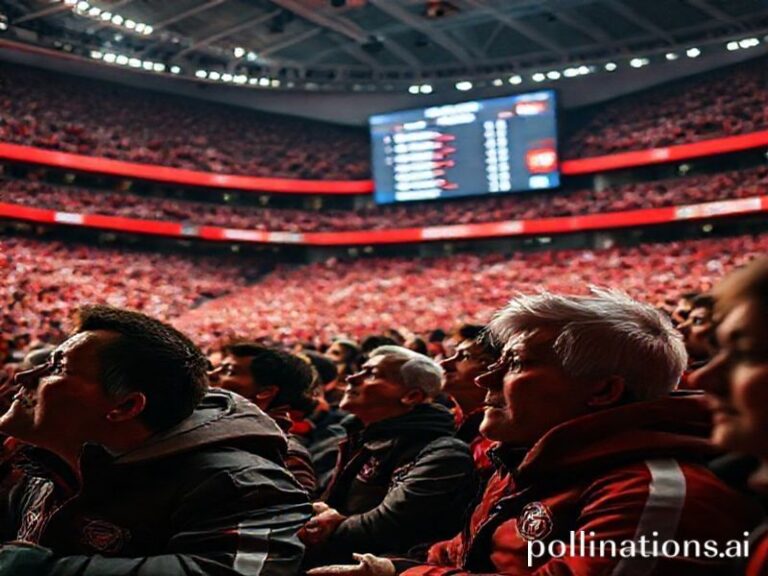Hyundai’s Alabama Raid: A Global Supply Chain Gets Handcuffed
Hyundai’s Alabama Plant Gets a Surprise Visitor: The Department of Homeland Security
By Dave’s Locker International Desk
Montgomery, Alabama—Nothing says “good morning, Vietnam” quite like a pre-dawn immigration raid on a factory floor. At 5:43 a.m. last Tuesday, while the rest of the planet debated whether AI would steal their jobs, Agents of the U.S. Department of Homeland Security arrived at Hyundai’s flagship Alabama assembly plant with flash-bangs, clipboards, and a level of punctuality German train conductors would envy. Their mission: to liberate 112 allegedly undocumented workers from the tyranny of gainful employment.
The immediate headlines—ICE detains dozens, Hyundai launches internal probe, Alabama congressman vows to “protect American jobs”—were predictable. Less predictable was the synchronized sigh of recognition rising from factory towns from Monterrey to Mumbai. After all, the global supply chain is the world’s longest conga line: one shove and everyone wobbles.
Let’s zoom out, shall we?
Hyundai’s Alabama plant is the crown jewel of the Korean automaker’s American dream: $1.8 billion invested, 3,000 direct jobs, and a convenient place to bolt Kias together without paying Pacific freight. It is also, by the grim calculus of modern labor markets, the human equivalent of a USB hub: interchangeable, replaceable, and occasionally counterfeit. The workers hauled away last week—mostly from Mexico, Guatemala, and a statistically improbable number from the same Honduran village—were allegedly subcontracted through a third-party staffing agency whose corporate motto might as well be “plausible deniability since 2014.”
This is not merely an Alabama story; it is a planetary parable. From the iPhone sweatshops of Shenzhen to the strawberry fields of Huelva, employers have discovered a magical loophole: hire a temp agency, the agency hires the workers, and voilà—your corporate ethics slide neatly into the overhead compartment. The arrangement works splendidly until someone in Washington remembers that midterm elections are coming and “tough on immigration” still polls better than “fully automated luxury communism.”
Cue the global implications.
South Korean executives, sipping instant coffee in Seoul conference rooms, watched the raid unfold on CNN with the same expression a homeowner reserves for termites in the foundation. Hyundai’s U.S. expansion strategy depends on cheap, flexible labor; Alabama’s political strategy depends on looking like it’s protecting “real” Americans. Somewhere in that Venn diagram overlap, a compromise will emerge—probably more paperwork, slightly higher wages, and a fresh batch of subcontractors with even shinier disclaimers.
Meanwhile, the governments of Mexico and Guatemala issued the diplomatic equivalent of a shrug emoji, noting that remittances from the United States—$58 billion to Mexico alone—remain more reliable than their own domestic economies. The Honduran ambassador, perhaps sensing a branding opportunity, reminded reporters that his compatriots “assemble cars with the same passion they apply to fleeing violence,” a soundbite so pitch-perfect it could headline a Netflix narco-drama.
Across the Atlantic, European automakers sent discreet memos to their U.S. subsidiaries asking, “Please confirm we’re not next.” In Turkey, garment bosses double-checked their Syrian workforce’s paperwork. And in the United Kingdom—where Brexit was supposed to end reliance on foreign labor—factory managers muttered darkly about “lessons learned” while queueing for yet another Home Office webinar on post-Brexit visas.
The broader significance? The raid is less about law enforcement than about optics enforcement. In a world where supply chains are global and accountability is local, every handcuff is a photo op. The workers will be replaced—by other workers, robots, or some ingenious fusion of the two—while the rest of us scroll past the story on our Korean-made phones, sipping Guatemalan coffee, wearing sneakers stitched in Vietnam.
And Hyundai? By Thursday the assembly line was humming again, staffed by a fresh crew whose documents were, for the moment, unassailable. The company’s stock dipped 1.2 %, then recovered on news of brisk SUV sales. Somewhere in Seoul, an accountant updated a spreadsheet labeled “Risk Mitigation” and moved on.
Because if globalization has taught us anything, it’s that the show must go on—preferably with a rotating cast.







